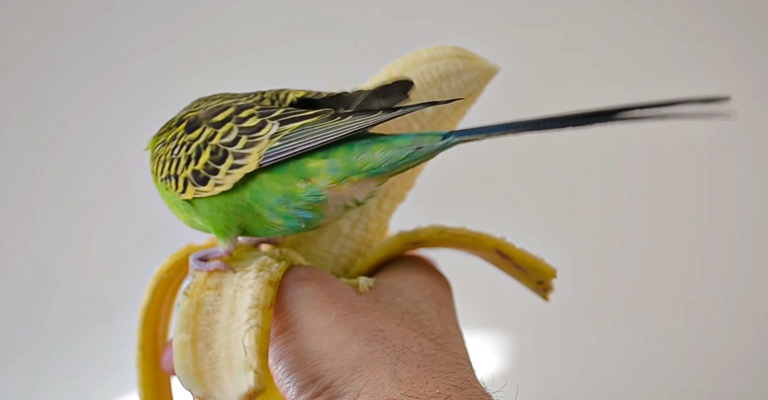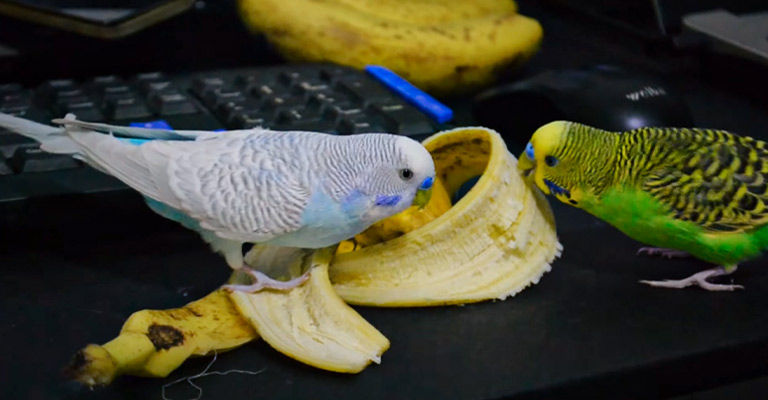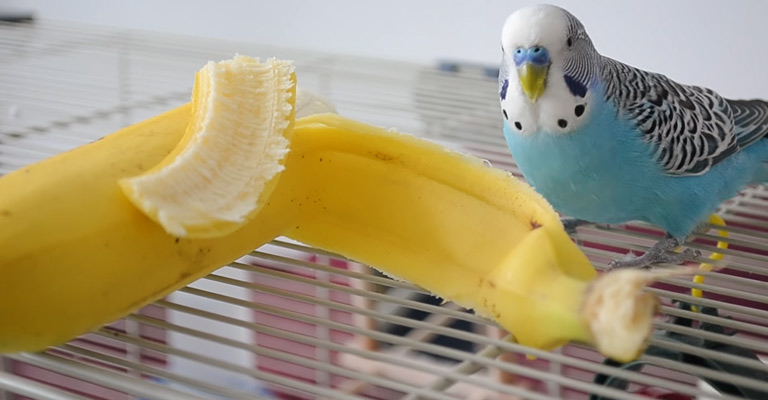Birdwatching and bird-feeding enthusiasts often wonder about the dietary preferences of their feathered friends. One common query that frequently arises is whether birds can safely enjoy bananas. Bananas, with their sweet and tropical allure, have become a popular choice for supplementing bird diets.
But are they a healthy option, and which birds relish this treat? In this blog post, we delve into the world of avian nutrition to explore the potential benefits and considerations of feeding bananas to birds.
Bananas offer more than just a burst of flavor; they bring essential nutrients that can benefit certain bird species. However, there are also important factors to keep in mind, including potential risks associated with their consumption. So, stay focused.

Can Birds Eat Bananas?
Many birds can eat bananas. Bananas are a good source of nutrients for birds, including vitamins, minerals, and carbohydrates. Small songbirds like sparrows, finches, and robins may peck at small pieces of ripe banana. Larger birds such as parrots, toucans, and crows can also enjoy bananas as part of their diet.
However, it’s important to offer bananas in moderation. While they provide valuable nutrients, bananas are also high in sugar, and excessive consumption can be harmful to birds.
To serve bananas safely, slice them into small, manageable pieces, and remove the peel. Avoid feeding birds overripe bananas, as they can ferment and produce alcohol, which can be toxic to birds.
As with any food, it’s essential to supplement a bird’s diet with a variety of other fruits, vegetables, seeds, and pellets to ensure they receive well-balanced nutrition.
Nutritional Benefits of Bananas for Birds
Bananas offer several nutritional benefits for birds when fed in moderation:
Carbohydrates
Bananas are rich in carbohydrates, providing a quick source of energy for birds. This energy is especially valuable during colder months or migration.
Vitamins

Bananas contain vitamins such as vitamin C, which can boost a bird’s immune system, and various B vitamins that support overall health.
Minerals
They provide essential minerals like potassium, which aids in muscle and nerve function, and manganese, which is important for bone health.
Dietary Fiber
The fiber in bananas can aid in digestion for some birds and help regulate their bowel movements.
Hydration
Bananas have a high water content, which can be particularly beneficial for birds during hot weather, helping them stay hydrated.
Natural Sugars
While high in sugar, bananas provide a natural, healthier alternative to processed sugary foods that some birds might encounter.
It’s crucial to remember that while bananas have these nutritional benefits, they should be just one part of a balanced diet for birds. Offering a variety of foods, including seeds, nuts, vegetables, and fruits, ensures that birds receive all the essential nutrients they need for optimal health.
Risks and Considerations While Feeding Birds Bananas

Feeding birds bananas can be beneficial, but there are also some risks and considerations to keep in mind:
Sugar Content
Bananas are relatively high in natural sugars, primarily fructose. While these sugars can provide energy, excessive consumption can lead to obesity and other health issues in some bird species. It’s crucial to offer bananas in moderation.
Digestive Issues
Some birds may have difficulty digesting bananas, especially if they are not used to eating them. Unripe or overripe bananas can be harder to digest and may cause gastrointestinal discomfort.
Fermentation
Overripe bananas can ferment and produce alcohol, which is toxic to birds. Always ensure you offer fresh, ripe bananas and remove any spoiled or overripe portions.
Attracting Pests
Leftover banana pieces can attract unwanted pests like ants and flies. To avoid this, clean up uneaten bananas promptly.
Nutritional Balance
Bananas should be part of a balanced diet for birds, not the sole or primary source of nutrition. Birds require a variety of foods to meet all their dietary needs, including seeds, nuts, vegetables, and other fruits.
Allergic Reactions
Some birds may be allergic to certain foods, including bananas. Monitor your birds for any signs of allergic reactions, such as itching, swelling, or difficulty breathing, and discontinue feeding bananas if such symptoms occur.
Feeding Preferences
Not all birds will be interested in or able to eat bananas. Some species may simply not like them, while others may lack the physical ability to consume them due to beak shape or size.
While bananas can offer nutritional benefits to birds, it’s essential to exercise caution and feed them in moderation.
Birds That Enjoy Bananas

Several bird species enjoy eating bananas as part of their diet. Here are some birds known to relish this tropical fruit:
Parrots
Many parrot species, including macaws, cockatoos, and Amazon parrots, are known to enjoy bananas. They often relish the sweet taste and can easily handle the fruit’s size.
Toucans
Toucans, with their large beaks, can easily consume pieces of banana. Bananas provide a valuable source of nutrition for these colorful, fruit-eating birds.
Orioles
Orioles are attracted to sweet, juicy fruits, and they may visit your feeder if you offer ripe banana slices. Baltimore Orioles, in particular, are known to enjoy them.
Mockingbirds
Northern Mockingbirds and other thrushes may eat small pieces of banana when available. These birds have a varied diet and will sample different foods.
Tanagers
Some tanager species, such as the Summer Tanager, may include bananas in their diet when they come across them.
Fruit Doves
Various fruit dove species in tropical regions feed on fruits, including bananas, as a significant part of their diet.
Jays
Blue Jays and other corvids are known to eat a variety of foods, including fruits. They may occasionally indulge in ripe banana slices.
Remember that individual bird preferences can vary, so not all members of these species may be interested in bananas. Always offer a variety of foods to cater to different bird species and their unique dietary preferences.
How to Offer Bananas to Birds?
Offering bananas to birds requires some preparation and care to ensure the birds can enjoy this treat safely. Here’s how to offer bananas to birds:
Choose Ripe Bananas
Select ripe bananas with yellow skin that is slightly speckled with brown spots. Overripe bananas may have started to ferment, which can be harmful to birds.
Slice into Small Pieces
Peel the banana and cut it into small, bite-sized pieces. Smaller pieces are easier for birds to handle and eat.
Remove the Peel
Birds typically eat only the inner fruit of the banana, so make sure to remove the peel entirely.
Place on a Feeder or Platform
You can offer banana pieces on a bird feeder, platform feeder, or even on a clean, flat surface. If using a platform feeder, ensure it has drainage to prevent water accumulation.
Monitor Consumption
Watch the birds as they discover the banana pieces. It may take some time for them to become accustomed to this new food. Be patient and observe which bird species are interested in.
Offer in Moderation
While bananas can be a treat, remember that they are high in sugar. Offer them in moderation to prevent birds from overindulging.
Clean Up
Uneaten banana pieces can attract pests, so be sure to remove any leftovers promptly. Clean the feeding area regularly to maintain a hygienic environment for the birds.
Combine with Other Foods
Bananas should be part of a diverse diet. Offer other foods like seeds, nuts, vegetables, and a variety of fruits to ensure the birds receive a balanced nutrition.
Stay Consistent
If birds in your area enjoy bananas, consider making them a part of your regular offerings. Consistency can encourage birds to return to your feeding area.
Observe Bird Reactions
Keep an eye on how the birds react to bananas. Some species may be more interested than others, and individual preferences can vary.
Remember that not all bird species will be interested in bananas, so continue providing a variety of foods to cater to the diverse tastes of local birds.
Other Bird-Friendly Fruits
Birds can enjoy a variety of fruits in addition to bananas. Offering a diverse range of bird-friendly fruits can attract different species to your yard and provide essential nutrients. Here are some bird-friendly fruits:
Apples
Birds like robins and waxwings often relish apple slices, especially in winter when other food sources are scarce.
Oranges
Orioles and tanagers are particularly fond of orange halves or slices. You can hang these on a specialized fruit feeder.
Berries
Blueberries, strawberries, raspberries, and blackberries are favorites of many bird species, including thrushes, mockingbirds, and jays.
Grapes
Small pieces of grapes can be enjoyed by various birds, such as American Robins and Northern Mockingbirds.
Melons
Watermelon and cantaloupe, cut into small cubes, can attract a range of birds, including sparrows and finches.
Cherries
Cherries, when pitted and sliced, can be enticing to various bird species, like Cedar Waxwings.
Pears
Sliced pears are appreciated by many fruit-eating birds, including tanagers and orioles.
Kiwi
Offer sliced kiwi to attract a variety of bird species that enjoy tropical fruits.
Peaches
Sliced peaches can be a treat for birds like woodpeckers and cardinals.
Plums
Cut plums into small pieces to entice birds like European Starlings and American Robins.
Pineapples
Pineapple chunks can be a favorite of some tropical bird species.
Figs
Fresh figs, when available, can be enjoyed by many birds, including mockingbirds and pigeons.
When offering fruits to birds, remember to cut them into small, manageable pieces and remove any seeds, pits, or tough skins that birds cannot eat.
Place the fruit on bird feeders, platform feeders, or in specialized fruit feeders. Be sure to clean up any uneaten fruit to prevent pests and maintain a hygienic feeding area.
FAQs
Not all birds are equally fond of bananas. While some species, like parrots and toucans, enjoy them, others may not be interested or able to consume them due to beak shape or dietary preferences. It varies from bird to bird.
Yes, bananas can be a healthy treat for birds when offered in moderation. They provide carbohydrates, vitamins, and minerals. However, their high sugar content means they should be part of a balanced diet, not the primary food source.
Peel and slice ripe bananas into small, bite-sized pieces. Remove the peel entirely, and place the pieces on a feeder or platform. Clean up any uneaten banana to maintain a clean feeding area.
Yes, overripe bananas can ferment and produce alcohol, which is toxic to birds. Feeding them too many bananas can also lead to excessive sugar intake, potentially causing health issues. So, offer bananas in moderation and ensure they are fresh.
You can offer a variety of bird-friendly fruits, such as apples, oranges, berries, grapes, and melons. These fruits attract different bird species and provide essential nutrients. Remember to cut them into small, manageable pieces and remove any seeds or tough skins.
Wrapping Up
While birds can indeed eat bananas, it’s crucial to approach this treat with care and moderation. Bananas can provide valuable nutrients, including carbohydrates, vitamins, and minerals, to certain bird species.
However, their high sugar content means they should be just one part of a well-balanced diet. To offer bananas safely, slice them into small pieces, remove the peel, and monitor bird reactions. Keep in mind that not all birds may be interested in bananas, and individual preferences vary.
By combining bananas with other bird-friendly fruits and foods, you can create a diverse and nutritious diet for your feathered visitors. With proper knowledge and responsible feeding practices, you can enhance your birdwatching experience while promoting the health of your avian companions.